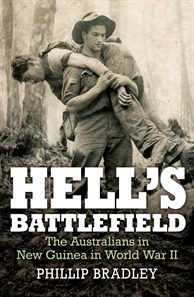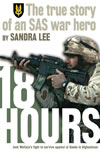At the bottom of page 157 in Phillip Bradley’s compelling, comprehensive and beautifully descriptive if confronting new book, sits a paragraph so remarkably modest yet freighted with such immense national importance that it begs to be re-read several times. The book is called Hell’s Battlefield, The Australians In New Guinea in World War Two.
Here’s what Bradley wrote.
“Among the unrecovered were four men of the 2/12th Battalion, including Lieutenant Talbot Logan. In 2006, after the author [Bradley] notified the Australian Army of a grave at Buna village, an investigation was begun. Using dental and other records, the scant remains were identified as those of Logan. Sixty-seven years after he fell in battle, he was buried among the other fallen from his battalion at Bomana cemetery, outside Port Moresby. They had died for love of country – ‘Ducit Amor Patriae’, as the battalion motto read.”
Bradley, a scientist by training, is a top amateur historian and his indefatigable research for Hell’s Battlefield (published recently by Allen and Unwin Australia, which also published my last book, Saving Private Sarbi, The True Story of Australia’s Canine War Hero) led him to help our nation finally properly honour two of our Diggers killed in a war almost 70 years old, but lost to the wider public.
Bradley writes that more than 100,000 Australians fought in New Guinea between 1942 and 1945 and hundreds of them – like Logan – never returned home. Others, again, like Logan, were physically lost to their families forever, with only memories to keep hope alive.
When I asked Bradley about his involvement in identifying Logan’s body, which led to the fallen soldier’s family attending a long delayed funeral at the cemetery, his response was as modest as the understatement in his book.
“I was quite proud of it,” he told me. “A lot of them went missing after the war; because of the conditions, even though they were buried on the battlefield they were never recovered.
“Some locals had found the remains earlier – they found an Australian gun, Australian helmet and Australian coins with the body.”
While locals informed authorities in Port Moresby of the discovery nothing came of it until Bradley was made aware of the find.
He did exhaustive research on possible identities and filed a report with the Australian Army, and a subsequent investigation was launched. Ultimately, Logan and another man were identified.
“I was very satisified,” Bradley says. “His family went to the burial and that’s a real closure for them. They knew he was dead but now he is resting with his mates in Bomana cemetery.”
The small passage is one of many highlights that run through Hell’s Battlefield. The personal stories of the men who fought, as told to Bradley in one-on-one interviews, are haunting and will indelibly etch onto your mind. He also relied on diaries, memoirs and letters sent from bloody battlefields to home to further limn the reality of war.
There are marvellous characters who go by charming Aussie nicknames like Teddy Bear and Hi Ho Silver and whose courage is awe inspiring. Bear, seriously wounded in the back by grenade blast and with an empty magazine, attacked an enemy Japanese soldier with his bayonet and prevailed.
Bradley’s gruesome descriptions of fallen soldiers, both allies and enemy, makes for tough reading, but it is essential to understand what the thousands of Australian soldiers endured.
His knowledge of the campaign that lasted three years and eight months and included some of the more recognisable battle pieces at Kokoda and the Japanese invasion of Rabaul, is undeniably encyclopaedic. His intimate, vivid descriptions of the harsh, unyielding landscape are born of years of visiting the battlefields, aided by interviews with scores of men who served there.
Hell’s Battlefield is a must-read for anyone interested in Australia’s involvement in New Guinea in World War Two. Reading it will give you a first hand account of the hellishness of war and the extraordinary camaraderie that comes from it.
And Bradley’s overriding message?
“Just to understand that the battle for New Guinea was the closest fought to our shores, and to recognise the service of the men. And, if they are still around, shake their hands and get their stories,” he says.
Hell’s Battlefield can be bought at any good bookstore, or online via AllenAndUnwin.com.au

